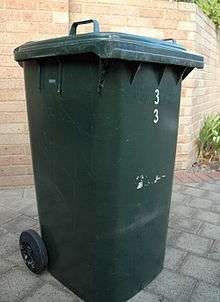bin
English

Pronunciation
- enPR: bĭn, IPA(key): /bɪn/, /bin/
- (Canada, UK, General Australian) IPA(key): /bɪn/
Audio (US) (file) - Homophone: bun (NZ), been (General American, Received Pronunciation) IPA(key): /bɪn/
Etymology 1
From Middle English binne, from Old English binne (“crib, manger”), from West Germanic, from Gaulish benna (“four-wheeled cart; caisson”) (compare Old Irish buinne, Welsh benn (“cart”), Old Breton benn (“caisson”)).
Noun
bin (plural bins)
- A box, frame, crib, or enclosed place, used as a storage container.
- a corn bin; a wine bin; a coal bin
- 1852-1853, Charles Dickens, Bleak House
- Though a hard-grained man, close, dry, and silent, he can enjoy old wine with the best. He has a priceless bin of port in some artful cellar under the Fields, which is one of his many secrets.
- A container for rubbish or waste.
- a rubbish bin; a wastepaper bin; an ashes bin
- 2013 August 10, Lexington, “Keeping the mighty honest”, in The Economist, volume 408, number 8848:
- British journalists shun complete respectability, feeling a duty to be ready to savage the mighty, or rummage through their bins. Elsewhere in Europe, government contracts and subsidies ensure that press barons will only defy the mighty so far.
- (statistics) Any of the discrete intervals in a histogram, etc
Derived terms
Synonyms
- (container): container, receptacle
- (container for waste): dustbin (British), rubbish bin (British, Australian), garbage can, trash can (both US)
Translations
|
|
- The translations below need to be checked and inserted above into the appropriate translation tables, removing any numbers. Numbers do not necessarily match those in definitions. See instructions at Wiktionary:Entry layout#Translations.
|
Verb
bin (third-person singular simple present bins, present participle binning, simple past and past participle binned)
- (chiefly Britain, informal) To dispose of (something) by putting it into a bin, or as if putting it into a bin.
- 2008, Tom Holt, Falling Sideways, Orbit books, →ISBN, p. 28:
- He put the bank statement in the shoebox marked "Bank Statements" and binned the rest.
- 2008, Tom Holt, Falling Sideways, Orbit books, →ISBN, p. 28:
- (Britain, informal) To throw away, reject, give up.
- 2002, Christopher Harvie, Scotland: A Short History, Oxford University Press, →ISBN, p. 59:
- This splendid eloquence was promptly binned by the pope, […]
- 2005, Ian Oliver, War and peace in the Balkans: the diplomacy of conflict in the former Yugoslavia, I.B. Tauris, →ISBN, p. 238:
- The CC [Co-ordinating Centre] had long since binned the idea of catching the regular shuttle service, […]
- 2002, Christopher Harvie, Scotland: A Short History, Oxford University Press, →ISBN, p. 59:
- (statistics) To convert continuous data into discrete groups.
- (transitive) To place into a bin for storage.
- to bin wine
Synonyms
- (dispose of in a bin): chuck, chuck away, chuck out, discard, ditch, dump, junk, scrap, throw away, throw out, toss, trash
- See also Thesaurus:junk
Translations
Derived terms
Etymology 3
Contraction of being
Etymology 4
Contraction of been
Verb
bin
- (obsolete, dialectal and text messaging) Alternative form of been
- Sir Thomas Browne
- Many of the lupus piscis I have seen, and have bin informed by the king's fishmonger they are taken on our coast […]
- Sir Thomas Browne
Etymology 5
Clipping of binary.
Biak
Dalmatian
Egyptian
French
German
Etymology
From Middle High German, from Old High German bim (“am”), from Proto-Germanic *beuną (“to be”), from Proto-Indo-European *bʰew- (“to be, become, appear”). Cognate with Dutch ben (“am”), Old English bēom (“am”). More at be.
German bin and Dutch ben have two sources:
Pronunciation
- IPA(key): /bɪn/
audio (file)
References
- Kluge, Friedrich (1989), “bin”, in Elmar Seebold, editor, Etymologisches Wörterbuch der deutschen Sprache [Etymological dictionary of the German language] (in German), 22nd edition, →ISBN
Guinea-Bissau Creole
Etymology
From Portuguese vir. Cognates with Kabuverdianu ben.
Indonesian
Mandarin
Romanization
bin
Usage notes
- English transcriptions of Mandarin speech often fail to distinguish between the critical tonal differences employed in the Mandarin language, using words such as this one without the appropriate indication of tone.
North Frisian
Etymology
From Old Frisian binda, which derives from Proto-Germanic *bindaną.
Swahili
Tok Pisin
Particle
bin
- Marks the simple past tense.
- 1989, Buk Baibel long Tok Pisin, Port Moresby: Bible Society of Papua New Guinea, 1:2:
- (please add an English translation of this quote)
-
See also
Tok Pisin tense markers:
Turkish
Pronunciation
- IPA(key): /ˈbin/
Etymology 1
From Ottoman Turkish بیك (biŋ, “thousand”), from Proto-Turkic *bïŋ (“thousand”). Cognate with Old Turkic 𐰉𐰃𐰭 (bïŋ), 𐰋𐰃𐰭 (biŋ), Old Uyghur mynk (mïŋ, “thousand”), Bashkir мең (meñ, “thousand”) and Mongolian мянган (mjangan, “thousand”) a Turkic borrowing.
Declension
| Inflection | ||||||||||||||||||||||||||
|---|---|---|---|---|---|---|---|---|---|---|---|---|---|---|---|---|---|---|---|---|---|---|---|---|---|---|
| Nominative | bin | |||||||||||||||||||||||||
| Definite accusative | bini | |||||||||||||||||||||||||
| Singular | Plural | |||||||||||||||||||||||||
| Nominative | bin | binler | ||||||||||||||||||||||||
| Definite accusative | bini | binleri | ||||||||||||||||||||||||
| Dative | bine | binlere | ||||||||||||||||||||||||
| Locative | binde | binlerde | ||||||||||||||||||||||||
| Ablative | binden | binlerden | ||||||||||||||||||||||||
| Genitive | binin | binlerin | ||||||||||||||||||||||||
| ||||||||||||||||||||||||||
Etymology 2
Welsh
Pronunciation
- IPA(key): /bɪn/
Mutation
| Welsh mutation | |||
|---|---|---|---|
| radical | soft | nasal | aspirate |
| bin | fin | min | unchanged |
| Note: Some of these forms may be hypothetical. Not every possible mutated form of every word actually occurs. | |||
Etymology 2
Mutated form of pin (“pine trees”).
Pronunciation
- IPA(key): /biːn/
Zoogocho Zapotec
References
- Long C., Rebecca; Cruz M., Sofronio (2000) Diccionario zapoteco de San Bartolomé Zoogocho, Oaxaca (Serie de vocabularios y diccionarios indígenas “Mariano Silva y Aceves”; 38) (in Spanish), second electronic edition, Coyoacán, D.F.: Instituto Lingüístico de Verano, A.C., page 16